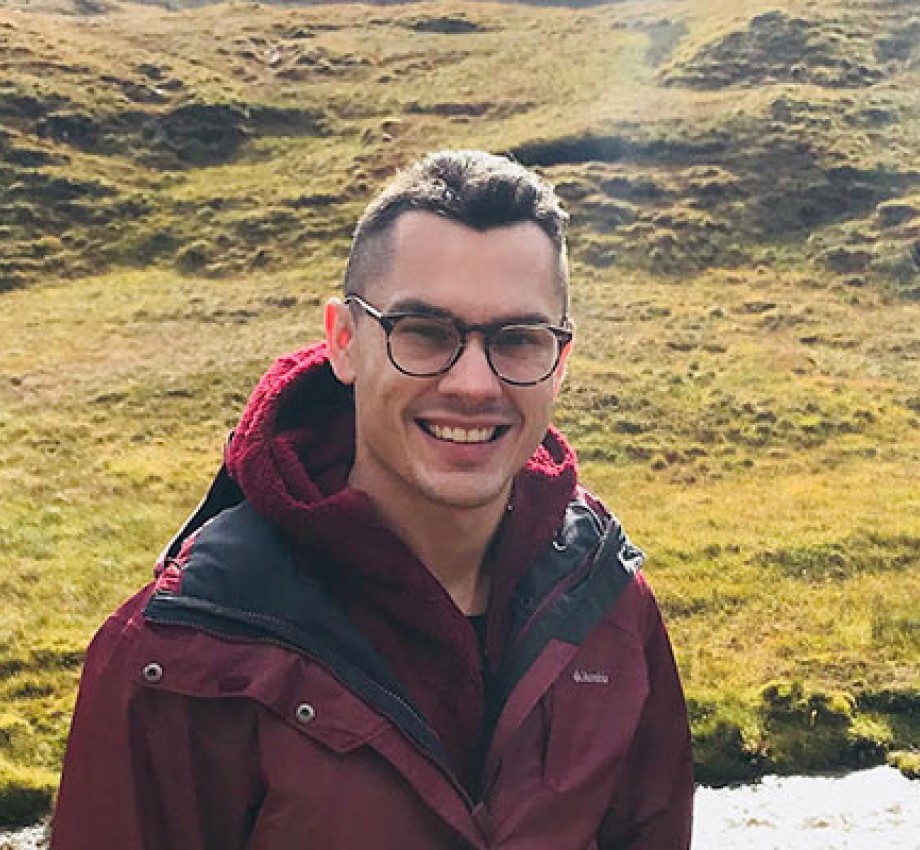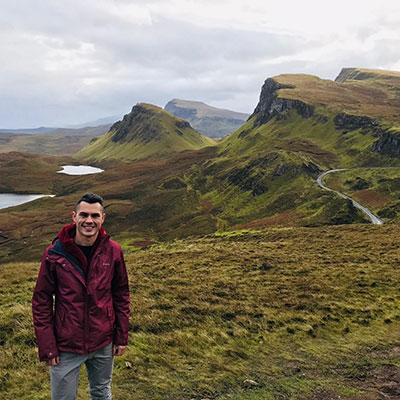The Course of a Counseling Career

Do you visualize your own career opportunities as a beautiful landscape, complete with green meadows and valleys, winding streams and roads? A new adventure around every bend? Mountains in the distance that represent new goals?
Well, that is how Post-Baccalaureate Program for Counseling and Psychology Professions graduate Michael Sanchez regards his journey to discovering his professional passion. His next adventure: graduate school to pursue a new career in counseling and psychology.
Let’s take a look at the winding path Michael traveled to get to today.
Exploring New Horizons
After graduating from Stanford University with a B.A. in East Asian Studies, Michael began his career at Airbnb in human resources.

“As a recruiter, I helped counsel and advise applicants on their career exploration and decision-making,” recalls Michael. “Then, in 2016, I pitched, designed and led Airbnb Connect, a 6-month apprenticeship program aimed at providing a pathway for underrepresented minorities and women to make career transitions into the tech industry as software engineers.”
He says of his work on Airbnb Connect, “This experience motivated my initial interest in social justice advocacy and psychology. I realized not only my ability to positively impact the direction of another’s life through my own work, but also my responsibility to advocate for members of traditionally underrepresented groups. Ultimately, my time at Airbnb was an invaluable opportunity for me to not only bolster my interpersonal skills, but also kindle my curiosity in the counseling and vocational psychology fields.”
The Confluence of Interests
“In 2017, I reached a point in my HR career where I began to question what I wanted to dedicate my energy and efforts to for the next 30-plus years of my life,” Michael recalls.
“My goal was to bridge the counseling and guidance aspect of my work as a recruiter with other interests, though it was still unclear to me what those ‘other interests’ were. This led me to discover the Post-Baccalaureate Program for Counseling and Psychology Professions. As I was working full time, the program’s course schedule and flexibility appealed to me.”
It only took a single course, Research Methods in Psychology, to affirm his interest.
“I decided to assess my interest in psychology by signing up for one course initially, rather than committing to the entire post-bacc program. This felt less risky for me,” Michael recalls. “My thought process was that if I didn’t enjoy the course, I could pivot and take another course to explore other career interests. However, the coursework quickly helped me realize my passion for the field.”
He also found his classmates to be like-minded people—and inspirational.
“It was helpful to simply sit and listen to the questions other students had regarding the field. It was also inspiring to hear the stories of my classmates: all of whom were passionate about counseling and psychology, ambitious to change careers and make their futures a reality. I really enjoyed the sense of community building and the support of fellow students.”
“The Counseling and Psychotherapy as a Career Option course provided the information I needed to better understand my short- and long-term career goals.”
Of the courses Michael completed, two were online: Introduction to Developmental Psychology and Abnormal Psychology.
“I especially enjoyed my online coursework,” he says. “These courses required extensive written assignments for each module, enabling me to critically analyze my own experiences, ideas and thoughts on the topics. The coursework not only allowed me to better hone my critical thinking, but also helped me realize my interest in lifespan development. This was important in helping me decide to pursue counseling psychology rather than clinical psychology.”
He also praises Dr. Christina Villarreal for her teaching methods in the classroom.
“In Psychology of Personality, Dr. Christina Villarreal was very helpful in explaining the responsibilities of a psychologist through case studies based on her own work experience. This enabled me to better visualize the day-to-day work and determine if the career would be right for me. She also was always extremely approachable and friendly, facilitating an environment where I could ask open-ended questions about the material, careers or graduate degree programs.”
One Course to Seal the Deal
But it was a course with Dr. Richard Chiovarelli and Tobirus Newby that most influenced Michael’s next step after completing the certificate.
“To say that the Counseling and Psychotherapy as a Career Option course was helpful would be a severe understatement,” enthuses Michael. “This course provided the information I needed to better understand my short- and long-term career goals. The structure of the coursework was practical, bringing together a lot of information on counseling and psychology; all the questions I had or needed to have but didn’t know how to ask were answered in this course.”
Not only did the course material help Michael realize what area of psychology he wanted to pursue, but the course’s curriculum design also offered him the opportunity to join the Shanti Project as a peer support volunteer.
“As I studied the various theories of psychology throughout my coursework, I felt captivated most by the humanistic Rogerian approach,” says Michael. “The Shanti Project is committed to practicing a similar humanistic, client-centered approach to care. As a peer support volunteer, I developed a supportive relationship with one client by utilizing the Shanti Model of active, reflexive listening. I was astonished that listening, paraphrasing and reframing the content of my client’s conversations enabled him to process themes and insights regarding life.
“This experience clarified my intention to pursue graduate education in counseling psychology.”
“Dr. Weisner was extremely helpful in prompting me to think further about my narrative as I was finalizing my personal statement.”
Mapping Out His Counseling and Psychology Career
With a turn toward graduate school a known next move, Michael needed to find the right graduate program to fit his needs.
“As my long-term goal is to pursue a career in both academia and social justice advocacy, I prioritized programs with faculty who dedicated their work to investigating social justice issues by utilizing a scientist-practitioner or scholar-practitioner model of training,” explains Michael. “It was important to me to begin building the research methodology and experimental design skills that I intend to continue honing in a doctorate and in my career.”
With those requirements in mind, Michael applied and received admission offers to five different programs:
- University of Denver, M.A. Counseling Psychology
- Boston College, M.A. Mental Health Counseling
- Lehigh University, M.Ed. Counseling and Human Services
- University of Minnesota, M.A. Educational Psychology
- University of Wisconsin–Madison, M.S. Counseling
In the end, Michael chose to pursue a Master of Science in Counseling at the University of Wisconsin–Madison School of Education.
“I selected UW–Madison primarily for three reasons: research, size and program focus,” says Michael. “First, the faculty’s research most directly aligns with my interest in exploring the educational and vocational experiences for students of color. Next, there are only 12–14 students in the cohort at UW–Madison, which reflects my preferred learning style and environment. I believe that the small cohort size will allow me to develop a close mentee relationship with the faculty as I cultivate my professional identity. Finally, their program focuses on exploring social justice issues and diversity. I am excited to delve deeper into these topics and discover ways I can help incite change in my communities.
“I am grateful to Dr. Stan Weisner, who wrote my composite letter of recommendation. Dr. Weisner was extremely helpful in prompting me to think further about my narrative as I was finalizing my personal statement.”
Michael’s personal identity continues to inform his career decisions, too. He doesn’t begin graduate school until August 2019, but he is already planning how he will help others look to the future and conquer their own mountains.
“My identity as a first-generation, low-income Latino college student has shaped my long-term ambition to pursue a career in academia,” says Michael.
“Following the completion of my doctorate, I intend to pursue a career as a research scientist and practitioner at the intersection of academia, practice, advocacy and policy. In becoming a practitioner and a research scientist, I intend to explore both the educational experiences of students of color and design intervention programs for higher education personnel so that they may more effectively meet the career development needs of college students from all backgrounds—but especially for those from underserved communities.”